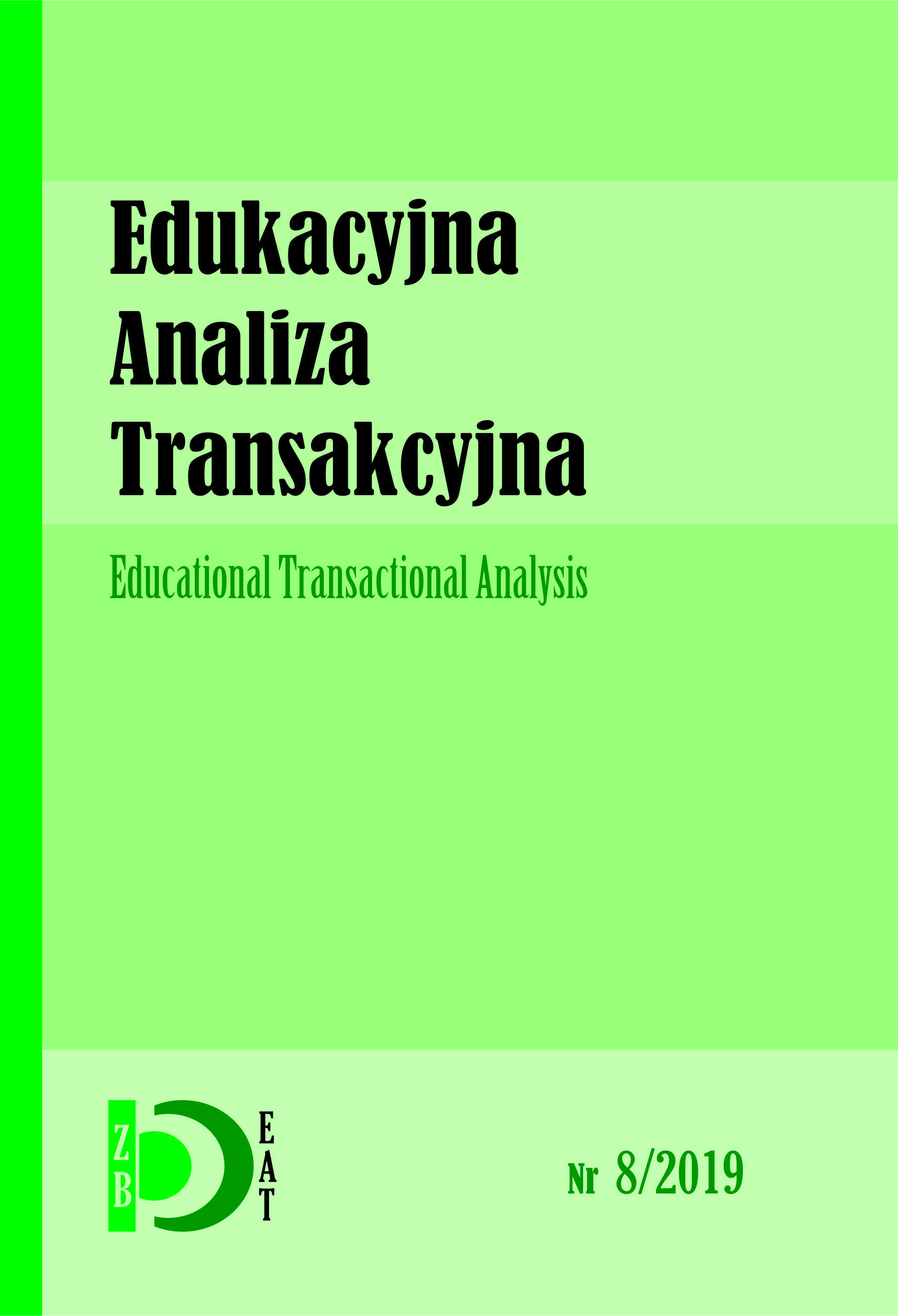The role of the corrective community method in developing selected social skills of its participants. A case study
- Authors
-
-
-
Agnieszka Reifland
-
- Keywords:
- corrective community method, socio-therapeutic youth club, social skills, contracts
- Abstract
-
Young people in adolescence are looking for role models and authorities, they also have an increased need for autonomy and willingness to decide about themselves. One of the places where these needs and expectations of children and adolescents are met is the Socio-Therapy Dayroom and Youth Club of the "Nest" Foundation for People in Need of Help in Katowice, where the corrective community method is used. Charges actively participate in the life and activity of the facility, as presented in the following article. The purpose of the article is to show the corrective community method and its importance for shaping social skills, as well as to present the results of the research carried out in the above-mentioned organisation.
- Downloads
-
Download data is not yet available.
- Author Biographies
- References
-
Adorno, T.W. (1978). Wychowanie po Oświęcimiu. Znak, 285, 353–366. Berne, E. (1979). The Structure and Dynamics of Organizations and Groups. New York: Ballantine Books.
Cornell, W.F., Graaf de, A., Newton, T., Thunnissen, M. (eds.) (2016). Into TA. A Comprehensive Textbook on Transactional Analysis. London: Karnac Books Ltd.
Drzeżdżon, W. (2011). Pedagogiczne uwarunkowania autorytetu nauczyciela-wychowawcy. Język – Szkoła – Religia, 6, 113–124.
Erikson, E.H. (2000). Dzieciństwo i społeczeństwo. Poznań: Dom Wydawniczy REBIS.
Górnicka, J.B. (2015). Metodyka pracy opiekuńczo-wychowawczej. Wybrane zagadnienia. Podręcznik akademicki. Opole: Wydawnictwo Uniwersytetu Opolskiego.
Jones, M. (1968). Beyond the therapeutic community: Social Learning and Social Psychiatry. Yale: University Press.
Koczurowska, J. (2012). Społeczność terapeutyczna w rehabilitacji uzależnień. In: P. Jabłoński, B. Bukowska, J.C. Czabała (eds.), Uzależnienie od narkotyków. Podręcznik dla terapeutów. Łódź: Krajowe Biuro do Spraw Przeciwdziałania Narkomanii.
Korczak, J. (2012). Prawo dziecka do szacunku. Warszawa: Rzecznik Praw Dziecka. Łobocki, M. (2003). ABC wychowania. Lublin: Wydawnictwo UMCS.
Martowska, K., Matczak, A. (2013). Pomiar kompetencji społecznych – prezentacja nowego narzędzia diagnostycznego. Psychologia Jakości Życia, 12 (1), 43–56, http://dx.doi.org/10.5604/16441796.1088803.
Martowska, K. (2012). Psychologiczne uwarunkowania kompetencji społecz- nych. Warszawa: Liberi Libri.
Neill, A.S. (1991). Summerhill. Harmondsworth: Penguin Books.
Okoń, W. (2016). Wprowadzenie do dydaktyki ogólnej. Warszawa: Wydawnictwo Akademickie Żak.
Sawicka, K. (2006). Socjoterapia jako forma pracy z dziećmi i młodzieżą przejawiającymi zaburzone zachowania. In: I. Dąbrowska-Jabłońska (ed.), Terapia dzieci i młodzieży. Metody i techniki pomocy psychopedagogicznej. Kraków: Oficyna Wydawnicza „Impuls”.
Stake, R.E. (2009). Jakościowe studium przypadku. In: N.K. Denzin, Y.S. Lin- coln (eds.), Metody badań jakościowych, vol. 1. Warszawa: Wydawnictwo Naukowe PWN.
Strumińska-Kutra, M., Koładkiewicz, I. (2012). Studium przypadku. In: D. Je- mielniak (ed.), Badania jakościowe. Metody i narzędzia, vol. 2. Warszawa: Wydawnictwo Naukowe PWN.
Śliwerski, B. (2005). Współczesne teorie i nurty wychowania. Kraków: Oficyna Wydawnicza „Impuls”.
Tokarska, B. (2013). Społeczność korekcyjna w świetlicy środowiskowej jako metoda pracy z młodzieżą zagrożoną niedostosowaniem społecznym. In: P. Adamiak, J. Pyżalski (eds.), Model działań systemowych – MDS. Podręcznik metodyczny. Łódź: Wydawnictwo EXALL.
Widawska, E. (2016). Ku czemu wychowywać ma szkoła? Refleksja w oparciu o model analizy transakcyjnej. Edukacyjna Analiza Transakcyjna, 5, 93–109, http://dx.doi.org/10.16926/eat.2016.05.06.
Wieczorek, Z. (2011). Pomidor... Zabawa czy zasada? Jak wykorzystać analizę transakcyjną w uczeniu asertywności? In: J. Jagieła (ed.) Analiza transakcyjna w edukacji. Częstochowa: Wydawnictwo AJD.
Yin, R.K. (2015). Studium przypadku w badaniach naukowych. Projektowanie i metody. Kraków: Wydawnictwo Uniwersytetu Jagiellońskiego.
- Downloads
- Published
- 2019-12-31
- Issue
- No. 8 (2019)
- Section
- Research Raports
- License
-
AUTHOR'S STATEMENT
I am aware that the Educational Transactional Analysis journal is published under a Creative Commons license - Attribution (https://creativecommons.org/licenses/by/4.0/legalcode).
By submitting the article, I agree to make it available under this license
How to Cite
Similar Articles
- Karol Motyl, Let's work or play game! The teachers' lounge in the light of transactional analysis theory , The Educational Transactional Analysis: No. 14 (2025)
- Milena Miałkowska-Kozaryna, Do Studies Provide Knowledge, Skills, and Social Competences – Are You Sure? , The Educational Transactional Analysis: No. 13 (2024)
- Edyta Halista-Telus, Iwona Zychowicz, Agency and community orientation and socialparticipation of young people aged 14 to 19 –research report , The Educational Transactional Analysis: No. 14 (2025)
- Justyna Józefowicz, Effective school in a crisis COVID-19 , The Educational Transactional Analysis: No. 10 (2021)
- Anna Pierzchała, Family situation in childhood and adolescence and scripting in terms of transactional analysis. Research report , The Educational Transactional Analysis: No. 11 (2022)
- Sławomir Kania, The effectiveness of social competence training in the prevention of aggressive behaviour of children – a review of the literature. Opportunities, limitations and new research perspectives , The Educational Transactional Analysis: No. 10 (2021)
- Anna Pierzchała, Emotional Intelligence and Reflexivity vs. Passivity in the Perspective of Transactional Analysis: A Research Report , The Educational Transactional Analysis: No. 13 (2024)
- Marika Oracz, Kinga Tworzowska, Paulina Jędrczyk, Anna Pierzchała, Adults' dreams. The first step of characterization using transactional analysis , The Educational Transactional Analysis: No. 11 (2022)
- Zbigniew Łęski, The Profile of Ego States and the Experience of Positive and Negative Emotions in the Context of Cyber Threat Vulnerability , The Educational Transactional Analysis: No. 13 (2024)
- Daniel Kukla, Mirosław Mielczarek, Education through work as a consciously organized activity to prevent risky behaviours of children and adolescents , The Educational Transactional Analysis: No. 14 (2025)
You may also start an advanced similarity search for this article.
Most read articles by the same author(s)
- Edyta Widawska, dr, Toward what the school has to bring up? Reflection based on the model of transactional analysis , The Educational Transactional Analysis: No. 5 (2016)

